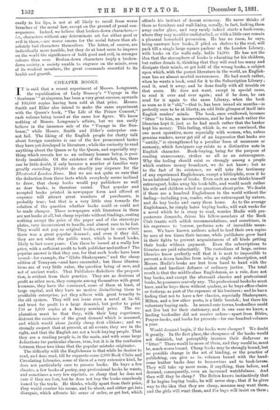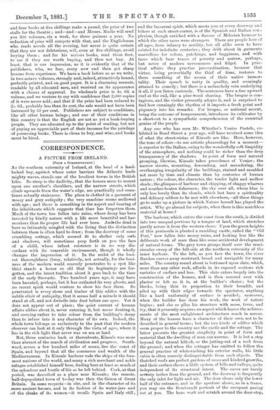CHEAPER BOOKS.
IT is said that a recent experiment of Messrs. Longmans, the republication of Lady Brassey's "Voyage in the ' Sunbeam ' " at sixpence, has been a very great success, upwards of 100,000 copies having been sold at that price. Messrs. Smith and Elder also intend to make the same experiment with the Queen's book, "The Life of the Prince Consort," each volume being issued at the same low figure. We know nothing of Messrs. Longman's affairs, but we can easily believe in the immense sale of the "Voyage in the Sun- beam," while Messrs. Smith and Elder's enterprise can- not fail. The liking of the English people for chatty talk about foreign countries is one of the few pronounced tastes they have yet developed in literature ; while the curiosity to read anything about the Queen or by the Queen, and especially any- thing which reveals her as an ordinary human beirg, is posi- tively insatiable. Of the existence of the market, too, there can be little doubt, if only because a number of families very greatly exceeding 100,000 do steadily pay sixpence for the Illustrated London News. But we are not quite so sure that the deduction from these facts which everybody seems inclined to draw, that cheap books would pay publishers as well as dear books, is therefore sound. That popular and accepted books printed in newspaper form and offered at sixpence will attract great numbers of purchasers, is probably true ; but that is a very little step towards the solution of the question whether books could or could not be made cheaper. These newspapers with literature in them are not books at all, but cheap reprints without bindings, costing nothing except the price of the paper and of the stereotype plates, very inconvenient to handle, and almost sure to be lost. They would not pay as original books, except in cases where there was a great popular demand ; and even if they did; they are not what the public want, which is bound books, likely to last some years. Can these be issued at a really low price, with a sufficient profit to both publisher and author ? The popular answer is that they can, for that such books have been issued—for example, the " Globe Shakespeare," and the cheap edition of Tennyson—and have succeeded ; bat those illustra- tions are of very little value, the question being of new, and not of ancient works. That Publishers disbelieve the proposi- tion, is evident from their practice. They are as desirous of profit as other men, they compete among themselves with great keenness, they have the command, some of them at least, of large capital, and they have no motive disinclining them to profitable enterprise, yet they adhere with great tenacity to the old system. They will not issue even a novel at 3s. 6d. and trust for profit ta a large demand, but prefer to print 730 or 1,000 copies at a heavy nominal price. The ex- planation must be that they, with their long experience, distrust the existence of the great demand which is assumed, and which would alone justify cheap first editions ; and we strongly suspect that at present, at all events, they are in the right, and that the English are not a book-buying people. That they are a reading people is, in the main, and with some large deductions for particular classes, true, but it is in the confusion between these two ideas that the popular mistake originates.
The difficulty with the Englishman is that while he desires to read, and does read, till he supports some 2,000 Book Clubs and Circulating Libraries, some of them of a very extensive kind, he does not particularly care to possess books. He buys a few classics, a few books of poetry, any professional books he wants, and sometimes a very few reprints, so cheap that he does not care if they are lost, but he does not buy the books ceaselessly issued by the trade. He thinks, wholly apart from their price, they would cumber his rooms, and lie about, and either get into disrepair, which affronts his sense of order, or get lost, which
offends his instinct of decent economy. He never thinks of them as furniture and wall-lining, usually, in fact, locking them away under glass, and very rarely indeed starts a book-room, where they may moulder undisturbed, or with a little care remain a pleasant household possession. He has no room, he says, being unaware how books, if piled on shelves to the roof, will pack till a single large square parlour at the London Library, with books on the walls only, holds 14,000. He has not the idea that the atmosphere of books is educating for his children, but rather dreads it, thinking that they will read too many and dissipate their minds, or get hold of the wrong books, a subject upon which, with the purest literature in the world, an English- man has an almost morbid nervousness. He had much rather, when he wants a book, send for it to the Subscription Library ; read it, send it away, and be done finally with all trouble on that score. He does not want, except in special cases, to read it over and over again ; and if he does, he can send for it again to the same Library, when the book as soon as it is "old,"—that is, has been issued six months—is perfectly sure to be at liberty, an odd little glimpse of itself into English readers' minds. The book, once swallowed, becomes " litter " to him, an inconvenience, and he had much rather the librarian kept it, just as he had much rather that the banker kept his money. This feeling, which is, we are convinced, the one most operative, more especially with women, who, unless genuine readers, never get rid of an impression that books are "untidy," is strengthened by a peculiar form of meanness or economy, which foreigners say exists as a distinctive note in English character. Book-buying, being for the purpose of reading unnecessary, strikes us all as an extravagance. Why the feeling should exist so strongly among a people which scatters money broadcast, we do not know ; but as to the fact of its existence, we will take the testimony of any experienced Englishman, except a bibliophile, even if he be an habitual buyer of books. Even such an one thinks himself extravagant, hides away his book-bills, and would much rather his wife and children asked no questions about price. We doubt if there are a hundred Englishmen in the world without the feeling—including you, reader, who are extravagant by nature, and do buy books and carry them home. As to the average Englishman, he simply hates buying books, will wait weeks for a novel which he is crazy to read, worries Mudie with pre- posterous demands, drives his fellow-members of the Book Club frantic with selfish recommendations, and sometimes, in his eagerness to borrow, performs acts of incredible mean- ness. We haste known authors asked to lend their own copies by men of ten times their income, while publishers grow hard in their fights to prevent acquaintances of all kinds getting their books without payment. Even the subscriptions to libraries are paid reluctantly. The custodians of large, serious libraries know perfectly well that it is next to impossible to prevent a dozen families from using a single subscription, and Messrs. Mudie's books are lent from hand to hand with the coolest and hardiest defiance of ordinary justice. The total result is that the middle-class Englishman, as a rule, does not buy books, and except the aforesaid classics and professional books, he possesses scarcely any. The professional books he must have, and he buys them without qualms, as he buys office-chairs or foolscap, as part of the expenses of his business ; and he has a feeling that not to have a few classics, especially Shakespeare, Milton, and a few other poets, is a little boorish ; but there his voluntary buying ends. In second-rate towns, booksellers could not live but for their stationery, and in one case we know, a leading bookseller did not receive orders— apart from Bibles, Prayer-books, and books for presents—for one hundred volumes a year.
Would demand begin, if the books were cheaper ? We doubt it greatly. In the first place, the cheapness of the books would not diminish, but perceptibly increase their disfavour as "litter." There would be more of them, and they would be, must be, much worse bound. Cheap books may be strongly bound, but no possible change in the art of binding, or the practice of publishing, can give us 5s. volumes bound with the hand- some leather backs dear to housewives and to book-lovers. They will take up more room, if anything, than before, and demand, consequently, even an increased watchfulness. And- then will they be cheap ? The Briton knows instinctively that if he begins buying books, he will never stop ; that if be gives way to the idea that they are cheap, mamma may want them, and the girls will want them, and the boys will insist on them ; and four books at five shillings make a pound, the price of two stalls for the theatre ; and—and—and Messrs. Mudie will send you 300 volumes, six a week, for three guineas a year. No reduction of price will compete with that, and the Englishman who reads novels all the evening, but never is quite certain -that they are not deleterious, will, even at five shillings, avoid buying them ; and for his serious books, read them first, to see if they are worth buying, and then not buy. At least, that is our impression, as it is evidently that of the publishers, who, we fear, every now and then get sharp lessons from experience. We have a book before us as we write, in two octavo volumes, strongly and, indeed, attractively bound, perfectly printed, and on good paper. It is a charming memoir, .readable by all educated men, and received on its appearance -with a chorus of approval. Its wholesale price is 4s. 6d. a volume, and we venture to say with confidence that 2,000 copies of it were never sold; and that if the price had been reduced to -2s. 6d., probably less than its cost, the sale would not have been increased by 50 per cent. Publishers are subject to conditions, like all other human beings ; and one of their conditions in this country is that the English are not as yet a book-buying people. They are educated up to the point of reading, but not of paying an appreciable part of their incomes for the privilege of possessing books. There is china to buy, and wine, and books must be hired.







































 Previous page
Previous page